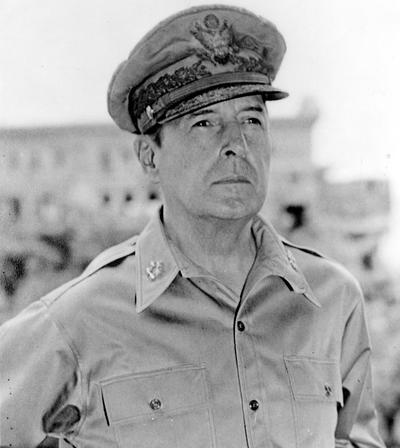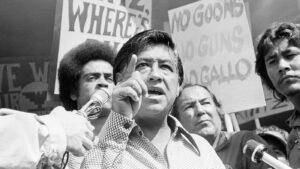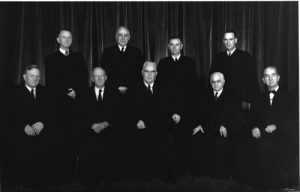President Truman has had it with General MacArthur! Truman has just been informed that a letter written by the respected General has been leaked to the press. MacArthur has provided Truman his last straw.1 Who were these two men, and what led them to this antagonistic event?
General MacArthur came from a military household. Douglas MacArthur was born in Little Rock, Arkansas on January 26, 1880. He was the son of the famous General Arthur MacArthur, a hero of the American Civil War. He attended the U.S. Military Academy and graduated with the highest honors. During World War I, he was promoted to General, and won several honors for heroism and leadership of the 42nd Rainbow Division. He retired from the army in 1935; however, he was called back to duty in July 1941. MacArthur was appointed the supreme leader for the Allied powers, and on September 2, 1945, he accepted the surrender of Japan.2 At the formal surrender ceremony, MacArthur spoke of peace and recollection in contrast to the expected conquest and dominion. The Japanese expected that when they went aboard the Battleship USS Missouri, they would be held to public disgrace, but that did not occur.3

In contrast to General MacArthur’s upbringing, President Truman was born into what can be considered the typical American family. Harry S. Truman was born on May 8, 1884, in Lamar, Missouri. He was the son of a livestock trader and farmer. Harry graduated from high school, held odd jobs, farmed for a time, and served in France during World War I. After the war, he married Bess Wallace and the couple had one daughter. Harry Truman opened a men’s clothing store, although it failed in the postwar depression. In 1922, he entered local Democratic politics and was elected judge of Jackson County. With the help of an influential political leader, Thomas J. Pendergast, he was elected to the U.S. Senate in 1934, where he voted consistently for New Deal legislation. Harry Truman became the 33rd president of the United States, after President Roosevelt’s death on April 12, 1945; he was president from 1945 to 1953.4
Those are the two men. But what brought them together to quarrel was the Korean War. That war was entering its fourth month when the two, MacArthur and Truman, met on Wake Island in the South Pacific to discuss the general situation of the war. MacArthur arrived on October 14, 1950 at 6:10 pm; however, the President did not arrive until October 15 at 6:30 am. The President and General had a separate meeting behind closed doors that lasted approximately forty minutes. It is unknown what they discussed exactly, since no other person was present nor did either party take notes of the meeting. The meeting was said to be casual. Truman removed his jacket due to the humidity and MacArthur smoked his briar pipe. By many observers, the reason for the Wake Island meeting was not to discuss serious policy concerns; there was no conference agenda and no extensive preliminary discussion between Truman and his advisers. MacArthur later observed that, “No new policies, no new strategy of war or international politics, were proposed or discussed.”5 Although some have made more of this meeting than was the actual case, considering what happened next, there does not appear to have been any problems between the two men at this time.
Then, MacArthur wrote a letter, which was sent to Joseph W. Martin (Republican), the Minority Leader in the House of Representatives. The contents of the letter were made public on April 5, 1951. In the letter, MacArthur implied that he agreed with Martin’s idea of using the forces of Chinese Nationalist Chiang Kaishek to invade the Chinese mainland.6 MacArthur objected to the president’s policy towards communism, and toward Chinese communism in particular.7 In the intervening time between the Wake Island meeting and MacArthur’s letter, the war in Korea had gone from virtual US victory to the entry of Chinese troops into the war. MacArthur wanted to expand the war as an opportunity to end communist Chinese rule and restore Chaing Kaishek as the legitimate ruler of China. Truman responded publicly to MacArthur’s veiled demand for the change of strategy through the Chairman of the Joint Chiefs of Staff General Omar Bradley, who testified before Congress: “Red China is not the powerful nation seeking to dominate the world. Frankly, in the opinion of the Joint Chiefs of Staff, this strategy would involve us in the wrong war, at the wrong place, at the wrong time, and with the wrong enemy.”8
On April 11, 1951, only ten months after he assumed command of the United Nations’ forces in Korea, MacArthur heard through a radio broadcast that he had been relieved of his duty by the Commander in Chief of the United States Military, President Harry S. Truman. Before the broadcast, Truman had a lengthy and painful discussion with his senior advisors, in which they came to the decision to fire General MacArthur as early as March 24, 1951, for insubordination explicit in his letter to Joseph Martin. Two weeks later, he instructed Secretary of Defense George C. Marshall to carry out MacArthur’s relief “with courtesy and dignity.”9

The firing of MacArthur was a huge surprise to the American people, but it was no surprise to the members of Truman’s staff. Tensions had been brewing between President Truman and General MacArthur for some time. MacArthur had feelings of distaste towards politicians.10 Men that were served with MacArthur could attest that he made his own decisions on “what a military situation required.”11 General MacArthur even publicly complained about Truman’s administration’s policies and even went so far as to suggest that Truman’s administration was responsible for military setbacks that were then occurring in Korea.12 MacArthur wrote a letter to Truman that was “definitely crossing the line.”13 Dean Acheson stated that, “nothing further was needed to convince me that the General was incurably recalcitrant and basically disloyal to the purposes of the Commander in Chief.”14 After the letter, the President considered removing MacArthur from his post, but he decided it was not the right time.15

The Korean War had been a conflict between North Korea and South Korea that eventually brought in the involvement of the United States, China, and other countries. It came to the world stage after World War II, and was viewed as a fight between free-world democracy and communism. President Truman stated that, “communist aggression in Korea would not be tolerated…. This act was very obviously inspired by the Soviet Union. If we let Korea down, the Soviets will keep right on going and swallow up one piece of Asia after another. We have to make a stand some time or else let all of Asia go. If we were to let Asia go, the Near East will collapse and no telling what would happen in Europe. Therefore, I have ordered our forces to support Korea as we can—or as long as the Koreans put up a fight and gives us something we can support.”16 Korea became the first major military conflict in what has become known as The Cold War.
The Korean War was fought on the Korean Peninsula from June 25, 1950 to July 27, 1953. It was a contest between the communist North (Democratic People’s Republic of Korea) and the Democratic South (Republic of Korea). The North invaded the South, which led to the United States involvement as well as nineteen other nations. MacArthur, without the authorization from Washington, shipped mortars, artillery, and other equipment to South Korea.17 And on a different occasion he again, without the authorization from Washington, deployed cargo ships filled with ammunition to South Korea.18 The leader of North Korea, Kim II Sung, believed that there was considerable civil strife south of the 38th parallel, the boundary between the two Koreas. And, he also believed that since there was growing opposition to South Korea’s president, Syngman Rhee, then the South Koreans would welcome him as a liberator, intent on overthrowing the Rhee government and reuniting the two Koreas. When the North invaded the South, it was assumed the Soviet Union was the muscle behind the invasion; however, that was incorrect. At the time of the attack, the Soviet Union was boycotting the United Nations (UN); and its ally, the Communist government of China, was hoping to invade the island of Taiwan without having to deal with a military intervention from the U.S.; so, they too were not directly and initially involved. The alliance between the regimes of Communist China and the Soviet Union was based on common ideology and current community interest.19 After fighting for three years, on July 27, 1953, the truce agreement was signed, bringing the fighting of the war to an end, but leaving the Korean peninsula still technically at war.20
After MacArthur’s removal, public outrage erupted. By the afternoon of April 12, the White House had received an estimated 5,000 telegrams; the staff estimated three-quarters were opposing the President. However, the editorial opinions were mixed, some supporting Truman’s decision, while others opposed it. On April 16, MacArthur was given a grand farewell by the Japanese people; he was finally returning to the United States. In the United States, he was greeted by masses of people, and parades were held in his honor. The parades celebrated him, but they were also a protest against President Truman and the policies he pursued.21
Both President Truman and General MacArthur held important roles in history and their legacies will not be forgotten. President Truman was a decisive leader during a period of great importance, and his reputation as president grew in the years following his retirement.22 General MacArthur was characterized as, “a man who inspired extreme emotions among admirers and critics alike.” MacArthur was a,”brilliant soldier who played a crucial role in American military affairs for more than three decades.”23
- Harry J. Manihafer, “Message to MacArthur,” American History 31, issue 2 (1996): 28. ↵
- Funk & Wagnalls New World Encyclopedia, 2016, s.v., “Douglas MacArthur.” ↵
- H. W. Brands, The general vs. the president (New York: Doubleday, 2016), 14. ↵
- Funk & Wagnalls New World Encyclopedia, 2016, s.v., “Harry S. Truman.” ↵
- John Edward Wiltz, “Truman and MacArthur: The Wake Island Meeting,” Military Affairs 42, no. 4 (December 1978): 173. ↵
- Harry J. Manihafer, “Message to MacArthur,” American History 31, issue 2 (1996): 28. ↵
- H. W. Brands, The general vs. the president (New York: Doubleday, 2016), 283. ↵
- “Senate Committees on Armed Services and Foreign Relations,” Military Situation in the Far East, hearings, 82nd Congress, 1st session, part 2, (1951): 732. ↵
- Harry J. Manihafer, “Message to MacArthur,” American History 31, issue 2 (1996): 28. ↵
- H. W. Brands, The general vs. the president (New York: Doubleday, 2016), 62. ↵
- H. W. Brands, The general vs. the president (New York: Doubleday, 2016), 79. ↵
- Harry J. Manihafer, “Message to MacArthur,” American History 31, issue 2 (1996): 28. ↵
- H. W. Brands, The general vs. the president (New York: Doubleday, 2016), 266. ↵
- H. W. Brands, The general vs. the president (New York: Doubleday, 2016), 266. ↵
- H. W. Brands, The general vs. the president (New York: Doubleday, 2016), 267. ↵
- H. W. Brands, The general vs. the president (New York: Doubleday, 2016), 86. ↵
- H. W. Brands, The general vs. the president (New York: Doubleday, 2016), 79. ↵
- H. W. Brands, The general vs. the president (New York: Doubleday, 2016), 94. ↵
- James S. Lay Jr. “Basic National Security Policy,” (A Report to the National Security Council, Washington, 1953. ↵
- Funk & Wagnalls New World Encyclopedia, 2016, s.v., “Korean War.” ↵
- H. W. Brands, The general vs. the president (New York: Doubleday, 2016), 315-321. ↵
- Funk & Wagnalls New World Encyclopedia, 2016, s.v., “Harry S. Truman.” ↵
- Funk & Wagnalls New World Encyclopedia, 2016, s.v., “Douglas MacArthur.” ↵



31 comments
Santos Mencio
A fascinating and well-written article to be sure. One can only imagine the things Truman and MacArthur spoke about behind closed doors on Wake Island. MacArthur certainly went behind Truman’s back, so I can understand why he was fired. However, I do think that Truman was making a brash decision in firing MacArthur as it seems to have created quite the political scandal. It is also interesting to think about how different the world might be had the Korean war escalated into a full-scale conflict between the U.S. and the P.R.C.
Samuel Vega
Like many, I am curious about what happened behind closed doors on Wake Island and the discussion between Truman and MacArthur. The article highlights the rivalry between the two powerful men. I was not aware of MacArthur making the decisions to ship equipment and weapons to Korea without the consent of Truman or Washington. MacArthur defied military protocol and did not respect the Commander in Chief. However, he was respected as a hero and received honors from the Japanese and the Americans when he retired.
Christopher Metta Bexar
This was an interesting article if the reader had not done any research on the topic. Mr Addicott in his review also shows that he either has not researched the topic or is a MacArthurite.
The facts of this case show that the President was well entitled to relieve General MacArthur. He had in fact been told by the Joint Chiefs he could have MacArthur tried for insubordination and stripped of rank.
I have read H W Brand’s book as well as the testimony of the Chiefs of Staff before Congress , the Pulitzer Prize winning biography by David McCullough as well as Mr Truman’s memoirs. They all contradict this article. I wish I could have enjoyed it more.
Aaron Sandoval
This article was very well written, and I really enjoyed it. I have always been fascinated with U.S. foreign conflict, but it is always fun to learn about the conflict within. So this article really stuck out for me. General MacArthur was without a doubt influential and a necessary figure in history, and many saw him as America’s savior, and being fired by President Truman was certainly a moment that even to this day not many agree with.
Kenneth Gilley
I cannot imagine the shock America must have experienced when Truman announced publicly that he was removing General MacArthur. One of the greatest military heroes of the United States, fired! I, too, think that Truman’s decision to fire MacArthur was a bit on the hasty side. MacArthur was a superb military leader, though he may have been a bit opinionated and stubborn.
Antonio Coffee
I found this article to be very well written and interesting. I enjoy military history and this was a great glimpse into the life of two men who have heavily influenced the legacy of the U.S. military. I enjoyed the opening as it caught my attention and the following paragraphs were a great way to keep that going by use of comparison. For me, the main take away from this piece of history is that even though a nation may have a goal, the different people working towards that goal may have competing opinions on how to achieve it.
Victoria Rodriguez
My Grandpa fought in the Korean War and I specifically remember him speaking to me about this power struggle. He would use it as an example to teach me about respect. Similar to the authors point, Truman had the right to relieve MacArthur of his position. As a country in a critical time in history, they administration needed to have open communication with the military and the military needed to be able to follow orders.
Gabrien Gregory
I really enjoyed this article, being a big fan of General MacArthur. This article to me was about authority. Recently, we have seen presidents discharge generals because of their going against the orders or the speakings of the commander in chief. The author points out the firing of MacArthur by Truman as reasonable, backed up by their historical evidence. At the end of the day, the president is in charge, not the generals, as frustrating as that may be at times. This was an interesting and important read on military and political authority and separation. -Reposted from Sep 26. on WP
Daniel Linstead
I find this article very interesting due to the fact that General MacArthur spoke out against the president and got fired. I found it interesting to make the connection to everyday life because if you speak out against someone in power even though you are correct your always going to be wrong. In this I find it ridiculous due to the fact that they think that General MacArthur is in the wrong even though his idea was going to save millions of Chinese citizens lives.
Gabrien Gregory
I really enjoyed this article, being a big fan of General MacArthur. This article to me was about authority. Recently, we have seen presidents discharge generals because of their going against the orders or the speakings of the commander in chief. The author points out the firing of MacArthur by Truman as reasonable, backed up by their historical evidence. At the end of the day, the president is in charge, not the generals, as frustrating as that may be at times. This was an interesting and important read on military and political authority and separation.